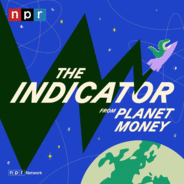People with American stocks in their portfolio are likely very happy right now. U.S. stocks were on a tear in 2024. But to some investors, that's a reason to look a longer look at their portfolio. Today on the show, one investor makes the case for the only free lunch in finance: diversification. Related episodes:Invest like a Congress member (Apple / Spotify) Rethinking what counts in investing (Apple / Spotify) For sponsor-free episodes of The Indicator from Planet Money, subscribe to Planet Money+ via Apple Podcasts or at plus.npr.org. Music by Drop Electric. Find us: TikTok, Instagram, Facebook, Newsletter. Learn more about sponsor message choices: podcastchoices.com/adchoicesNPR Privacy Policy

Wirtschaft
The Indicator from Planet Money Folgen
A bite-sized show about big ideas. From the people who make Planet Money, The Indicator helps you make sense of what's happening in today's economy. It's a quick hit of insight into money, work, and business. Monday through Friday, in 10 minutes or less.
Folgen von The Indicator from Planet Money
300 Folgen
-
Folge vom 02.01.2025Why to look twice when your portfolio is doing well
-
Folge vom 31.12.2024The curious rise of novelty popcorn buckets (Encore)Even before the Dune: Part 2 popcorn bucket went viral this year, movie theaters have been trying all types of ways to lure customers back. There's reclining seats, expanded menu options, and even more merchandise. Today on the show, we track the rise of the popcorn bucket and its afterlife on eBay. This piece originally aired on July 23, 2024.Related episodes: Coyote vs. Warner Brothers Discovery (Apple / Spotify) Why platforms like HBO Max are removing streaming TV shows (Apple / Spotify)Is movie night back?For sponsor-free episodes of The Indicator from Planet Money, subscribe to Planet Money+ via Apple Podcasts or at plus.npr.org.Music by Drop Electric. Find us: TikTok, Instagram, Facebook, Newsletter.Learn more about sponsor message choices: podcastchoices.com/adchoicesNPR Privacy Policy
-
Folge vom 30.12.2024Invest like a Congress member (Encore)There are some new funds that track stock trading by members of Congress and their family. So we thought, why don't we get in on that? Today on the show, we crack open the Planet Money Investment Jar to learn more about how our political leaders play the market, investing in funds tracking Democratic and Republican stock trades. Whether Congressional stock trading should be limited is a hotly debated matter. So to test whether lawmakers are beating the market, Dartmouth College economist Bruce Sacerdote and his co-authors pitted lawmakers' stock picks against reindeer at a Christmas-styled theme park. Trust us for this ride! It'll all make sense with some intriguing results. This piece originally aired June 18, 2024. Related listening: Stock traders are trying to beat the market — by copying lawmakers WTF is a Bitcoin ETF?(Apple / Spotify) Planet Money's Toxic Asset Planet Money Summer School: Investing For sponsor-free episodes of The Indicator from Planet Money, subscribe to Planet Money+ via Apple Podcasts or at plus.npr.org. Music by Drop Electric. Find us: TikTok, Instagram, Facebook, Newsletter. Learn more about sponsor message choices: podcastchoices.com/adchoicesNPR Privacy Policy
-
Folge vom 27.12.2024Half a billion people need reading glasses. Why can't they get them? (Encore)If you need some reading glasses in the United States, you don't have to break the bank to pick some up. That's important for older folks who need a little extra magnification. But in some parts of the world, people who need readers don't have that privilege. Today on the show, we'll find out why that is and learn the economic solution to the reading glasses shortage.This piece originally aired October 9, 2024. Related episodes:Two indicators: supply chain solutions (Apple / Spotify) For sponsor-free episodes of The Indicator from Planet Money, subscribe to Planet Money+ via Apple Podcasts or at plus.npr.org.Music by Drop Electric. Find us: TikTok, Instagram, Facebook, Newsletter. Learn more about sponsor message choices: podcastchoices.com/adchoicesNPR Privacy Policy
